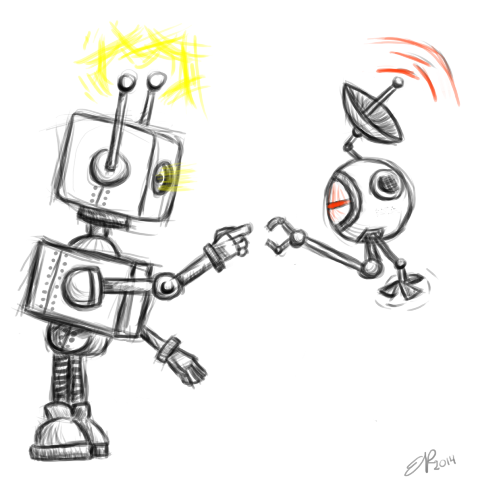by epo
on October 9, 2014
at 9:12 pm
9 October 2014 | Sharing is Caring | №6
What does it mean to ‘share’?
The online world is brimming with ‘share’ widgets. Just watched a video on youtube? Feel like those belonging to your social circles (virtual or real) should know of its existence? No worries, youtube’s share button has options for everyone: you can post the video on your facebook feed, tweet it, put it up on reddit, blog it on tumblr…and the list goes on.
There are really two types of sharing. The sharing buttons sharing, where you shine a spotlight on a work existing in the commons, passing along what is already out there in the great web that is our virtual world. And then there is the sharing of you. The sharing of work emanating from you, work which until that point did not exist in the world. The sharing of your name, your history, your thoughts, your feelings.
That youtube video that you just watched: maybe you liked it. Press the like button. Maybe it inspired you to write a poem: post that poem on your facebook wall, on your blog. And then the first type of sharing is activated and, who knows, three days later you might find yourself on Saturday Night Live. Or, if your post speaks a little too much to the macabre, maybe under CIA investigation.
To be clear, we are talking about the virtual world. We are not talking about getting coffee with a friend and sharing your feelings about ending world hunger. We are not talking about professing your love of Obama in a public mall for all to hear. We are talking about a world where the public is not visible to you. The ‘public’, those who get to be on the other end of your sharing, is a set of individuals constrained neither geographically nor temporally.
Enter the Privacy Question.
We, as a society, are a bit obsessed with privacy at the moment. Not that it is unwarranted. It is ridiculously easy for a stranger minimally gifted in the computer arts to glean a lot of information on you based on what is out there. Everything nowadays has an online side. Exhibit A: supermarket point cards demand online accounts and cater offers to you based on your purchase history. Exhibit B: to comment on MIT’s latest bioethics lecture, you have to create an account.
A few clicks of the mouse and a stranger from this nebulous ‘public’ knows what you eat every week, who you talk with online, what your political leanings are, what your musings on Schrödinger might be, and where you got tickets for last Friday.
That bothers us (or at least, it should, according to the media). The question we have to stop and ask is…why does it bother us?
We have a medieval-occult-esque fascination with our True Name. Without veering too far off the path, aliases have always been tied to the underlying idea that our true given name is a powerful thing. In novels of the epic fantasy genre, it is a recurring truth that you would be an idiot to give your True Name to a stranger or spirit; whoever knows your True Name can control you, exploit you, and generally unleash a chain of events with you as the protagonist that you will be helpless to stop.
So, when we create an account for our supermarket points card, we hesitate over the cursed asterisked fields of “First Name” and “Last Name”. Entering our True Name would then tie everything on that online account to the growing data-about-who-you-are-and-what-you-do file. The next purchase you make, it will be your purchase. Not mathwhizz121’s or tiger_bUtTeRfLy’s (both adequate anonymity accruing aliases) purchase.
Does it matter? Should it bother us that people can find out what we eat, what silly videos we like to watch, who we agree with in the local campaign, what our ideas are?
My submission: no. Evidently, there are exceptions. But in general, we shouldn’t let it bother us. Louis XIV had courtiers (including strangers) wash and clothe his naked body every morning of his life. We are who we are, we buy what we buy, we say what we believe in that moment. We should not be ashamed of this, or want to hide it, or be irrationally afraid that somehow divulging our ethos to a public we cannot quantify or see will lead to some horrible outcome. Because, really, what horrible outcome would this be? A clone of your come to steal your identity (which, granted, does sound pretty terrifying)?
As I said, there are exceptions. But we need to be less apt to cloak ourselves in a veil of secrecy. You should take ownership of your work, your words, your thoughts. Comment on that MIT lecture with your True Name. We need to use the great podium the internet can give us from which to vault even the silliest of our ideas.
A drop of water may be quickly swallowed into the ocean, but its ripples are not. Bill Gates is quoted saying that he took Microsoft to India to find the actual one in a million. That is how we should see the internet. Sharing who we are allows us to develop a world of very different, unique individuals.
Ultimately, the virtual world has given us a new way to share, one not locked by geographic or temporal constraints. We can share what exists in the commons and share ourselves with the commons. We can help create the commons. We have to take ownership of ourselves in this reality and in doing so we will make the virtual world a world of people, not half-cloaked hesitant projections of shadows.
keywords: sharing, social media, web of people, privacy, commons, True Name, you, public
©2014-2015 Robin, Who Wears a Hood Powered by WordPress with ComicPress








Very interesting, though there’s something to be said for a segmentation of self into actual versus virtual. Our virtual names may be just as much a true representation of who we are as our actual names
Also ironic, that there is no “share” button for this comic.
Looking forward to reading a lot more